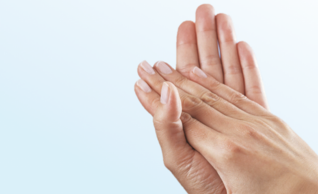As part of world "Clean Your Hands" day on 5 May, Hirslanden Clinique La Colline is launching a hand hygiene campaign during the week 1 to 8 May.

Clinique La Colline is taking advantage of this WHO (World Health Organization)-initiated day to remind its health staff and the general public that hand hygiene is vital to the safety of patients in a hospital environment.
We asked Marie-Christine Delattre, Head of Hygiene and Patient Safety, to explain this issue to us.
1. Why is good hand hygiene important ?
Under favourable conditions (temperature, humidity, etc.), micro-organisms grow extremely quickly. They can multiply by a factor of 4 million in 8 hours. Bacteria can survive on inert surfaces (door handles, lift buttons, support bars on the bus, mobile phones, etc.) and when hands come into contact with these surfaces, they become contaminated and act as vectors for these germs.
Good hand hygiene therefore removes these micro-organisms and means they are not passed on.
2. Why is it important for healthcare staff when taking care of patients ?
Hand hygiene remains the most important defence against healthcare-related infections. Inadequate hand hygiene is considered to be the number-one cause of transmission of healthcare-related infections. Furthermore, there are many consequences associated with these infections: increased hospitalisation time and all that entails for the patient, increased costs, and sometimes even death.
According to older estimates, approximately 70,000 cases of disease and 2,000 deaths are caused by healthcare-related infections in Switzerland annually. For me, this represents a very good reason to want to invest in the fight against these infections on behalf of our patients.
Even during so-called "clean" healthcare procedures, healthcare staff can be contaminated by germs on their hands or gloves. Bacteria aren't always where you expect them to be and you need to be extremely vigilant, even when there seems to be a low risk.
3. Are there guidelines for healthcare staff ? And how do you make sure these guidelines are followed ?
Yes, we have guidelines, of course. As part of the 10 Standard Precautions (prevention methods put in place to limit healthcare-related infections), one precaution is specifically directed at hand hygiene. This precaution highlights 5 instructions on hand hygiene (when it is necessary to disinfect the hands) as well as explanations about hand washing itself, including how long to wash and disinfect for.
The 5 instructions on hand hygiene are:
- Before initial contact with the patient
- Before an aseptic procedure
- After the risk of exposure to organic fluids
- After contact with the patient
- After contact with the patient's environment
So that we can be sure that these instructions are being carried out, we carry out internal audients among our healthcare staff. As part of efforts to prevent infections, the Hirslanden Group recommends observing staff while they are washing their hands. Members of the healthcare staff are observed during a procedure to check how they disinfect their hands, when they do it, for how long, and so on.
To facilitate and encourage good hand hygiene, every room at Clinique La Colline has a bottle of disinfectant and the staff also carry bottles on them. Staff also have easy access to wash basins.
The purpose of these measures is to prevent the spread of micro-organisms from one site to another in the same patient, to other patients or to staff by reducing the number of micro-organisms on the hands. It is important to bear in mind that disinfecting the hands thoroughly removes 99.9 % of germs on the skin.
So let's all wash our hands !
